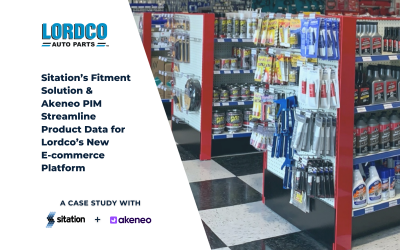This is the third installment of Overcoming Year Make Model Challenges. Part 1 and Part 2 open this series with a deep understanding of industry challenges. Sitation’s Director of Automotive Solutions, Steve Bach shares the necessary pieces to overcoming fitment data challenges and explains the value of mastering this segment of automotive data.
IV. Overcoming Year Make Model Data Management Challenges with PIM or MDM Systems
A. Centralized Data Repository: Streamlining Year Make Model Data Management
PIM and MDM systems offer ecommerce businesses a centralized repository for YMM data management. This single source of truth ensures that all product information, including YMM attributes, is stored in one location, simplifying data access and updates. With a centralized platform, businesses can eliminate data silos, reduce duplication, and enhance collaboration among teams involved in managing product data. This consolidation leads to increased efficiency and accuracy, as changes made in the central repository automatically reflect across all product listings, ensuring a consistent shopping experience for customers.
B. Data Standardization: Ensuring Consistency in Year Make Model Data
Standardizing YMM data formats and attributes is essential for efficient data management. PIM and MDM systems play a pivotal role in achieving data standardization by providing tools to transform diverse data formats into a uniform structure. These systems enable businesses to define data schemas, data validation rules, and data mapping, ensuring that YMM data adheres to industry standards and best practices. Through data standardization, businesses can mitigate errors caused by inconsistent data and improve the accuracy of product recommendations based on vehicle compatibility.
This can be even more difficult to manage with YMM data as mid-year model changes can present both opportunities and challenges for automobile manufacturers and retailers. This occurrence typically happens when an automaker introduces new models or implements updates to existing ones during the production year, creating a situation where two versions of the same model coexist for a period.
C. Data Enrichment: Enhancing Year Make Model Data with Additional Product Information
PIM and MDM systems offer robust data enrichment capabilities, allowing businesses to enhance YMM data with additional product information. This enrichment process involves associating various attributes, such as product specifications, images, descriptions, and compatibility notes, with specific YMM combinations. By enriching YMM data, businesses provide customers with comprehensive and detailed product information, empowering them to make well-informed purchasing decisions. Additionally, data enrichment contributes to improved SEO rankings, as search engines favor websites with rich and informative content.
D. Automated Updates: Streamlining Year Make Model Data Maintenance
The dynamic nature of YMM data requires constant updates to ensure accuracy and relevance. PIM and MDM systems simplify this process through automation features. By integrating with industry databases and suppliers’ feeds, these systems can automatically fetch and update YMM data in real-time. Automated updates ensure that the product catalog is up-to-date with the latest vehicle information, saving businesses valuable time and effort while reducing the risk of selling outdated or incompatible products.
E. Cross-Reference Management Solutions: Ensuring Accurate Fitment Information
Accurate cross-referencing between YMM data and product attributes is vital to provide customers with precise fitment information. PIM and MDM systems offer advanced cross-reference management solutions to establish and maintain these associations efficiently. Businesses can create robust cross-referencing methodologies and use data linking tools to ensure products are accurately matched with compatible vehicles. This meticulous approach instills customer confidence, reducing the likelihood of returns due to compatibility issues.
By leveraging the capabilities of PIM and MDM systems, businesses can overcome YMM data management challenges and create a seamless shopping experience for their customers. These systems provide the foundation for efficient data management, allowing businesses to thrive in the competitive ecommerce landscape. In the next section, we will explore best practices for successful YMM data management and optimization. Let’s continue.
Please join us for the fourth and final blog on this series, focused on best practices for success.
Contact us to be connected to our team of automotive experts and begin overcoming your data challenges right away.





